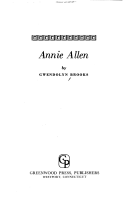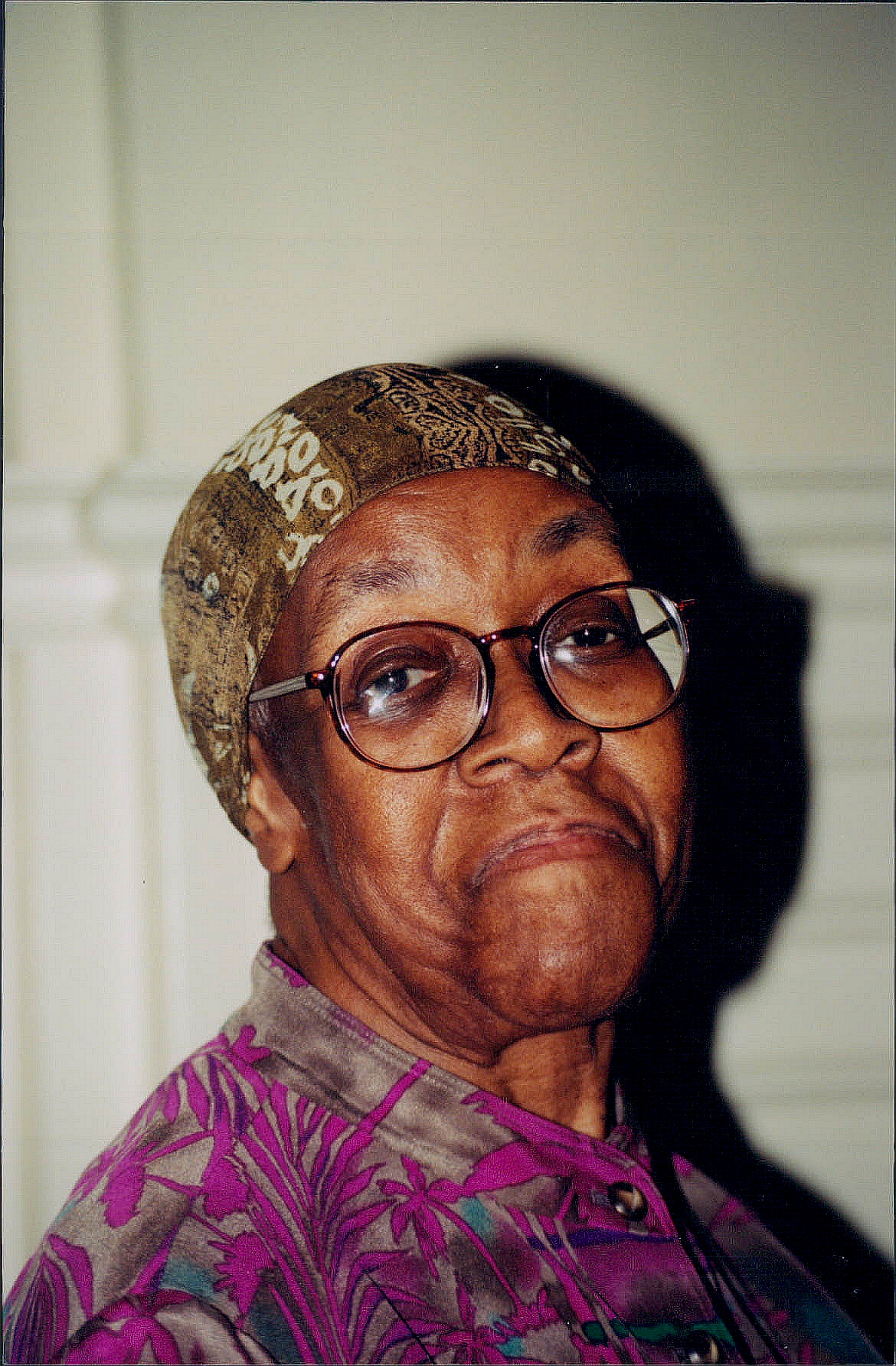Works

Maud Martha
Gwendolyn Brooks
Annie Allen
Gwendolyn BrooksFamous Gwendolyn Brooks Quotes
“I am a writer perhaps because I am not a talker.”
My Soul Looks Back, 'Less I Forget (1995) by Dorothy Winbush Riley
"Song of Winnie"
Winnie (1988)
Variant: My Poem is life, and not finished.
Context: My Poem is life, and not finished.
It shall never be finished.
My Poem is life, and can grow.
Wherever life can grow, it will.
It will sprout out,
and do the best it can.
I give you what I have.
You don’t get all your questions answered in this world.
How many answers shall be found
in the developing world of my Poem?
I don’t know. Nevertheless I put my Poem,
which is my life, into your hands, where it will do the best it can.
Gwendolyn Brooks Quotes about love
The Mother (1945)
“To be in love
Is to touch with a lighter hand.
In yourself you stretch, you are well.”
"To Be In Love"
Variant: To be in love
Is to touch with a lighter hand.
Source: Selected Poems
The Good Man
“Already I am no longer looked at with lechery or love.”
A Sunset of the City
Context: Already I am no longer looked at with lechery or love.
My daughters and sons have put me away with marbles and dolls,
Are gone from the house.
My husband and lovers are pleasant or somewhat polite
And night is night.
Gwendolyn Brooks Quotes about the world
“Art is a refining and evocative translation of the materials of the world.”
Black Poetry Writing (1975)
“You don’t get all your questions answered in this world.”
"Song of Winnie"
Winnie (1988)
Context: My Poem is life, and not finished.
It shall never be finished.
My Poem is life, and can grow.
Wherever life can grow, it will.
It will sprout out,
and do the best it can.
I give you what I have.
You don’t get all your questions answered in this world.
How many answers shall be found
in the developing world of my Poem?
I don’t know. Nevertheless I put my Poem,
which is my life, into your hands, where it will do the best it can.
"An Interview with Gwendolyn Brooks", Contemporary Literature 11:1 (Winter 1970)
Gwendolyn Brooks: Trending quotes
“Live not for Battles Won.
Live not for The-End-of-the-Song.
Live in the along.”
Source: Report from Part One
“We are each other's harvest; we are each other's business; we are each other's magnitude and bond.”
Paul Robeson
Context: That time
we all heard it,
cool and clear,
cutting across the hot grit of the day.
The major Voice.
The adult Voice
forgoing Rolling River,
forgoing tearful tale of bale and barge
and other symptoms of an old despond.
Warning, in music-words
devout and large,
that we are each other's
harvest:
we are each other's
business:
we are each other's
magnitude and bond.
“That is the Crazy Woman
Who would not sing in May.”
"The Crazy Woman"
Context: And all the little people
Will stare at me and say,
"That is the Crazy Woman
Who would not sing in May."
Gwendolyn Brooks Quotes
“A poem doesn’t do everything for you.
You are supposed to go on with your thinking.”
"Song of Winnie"
Winnie (1988)
Context: I pass you my Poem.
A poem doesn’t do everything for you.
You are supposed to go on with your thinking.
You are supposed to enrich
the other person’s poem with your extensions,
your uniquely personal understandings,
thus making the poem serve you.
“Wherever life can grow, it will.
It will sprout out,
and do the best it can.”
"Song of Winnie"
Winnie (1988)
Context: My Poem is life, and not finished.
It shall never be finished.
My Poem is life, and can grow.
Wherever life can grow, it will.
It will sprout out,
and do the best it can.
I give you what I have.
You don’t get all your questions answered in this world.
How many answers shall be found
in the developing world of my Poem?
I don’t know. Nevertheless I put my Poem,
which is my life, into your hands, where it will do the best it can.
“I pass you my Poem! — to tell you
we are all vulnerable”
the midget, the Mighty,
the richest, the poor.
Men, women, children, and trees.
I am vulnerable.
"Song of Winnie"
Winnie (1988)
The above statements have been widely published in the above format as lines of verse attributed to Brooks, usually as a poem titled "Corners on the Curving Sky" — but one website http://web.archive.org/20090809112040/www.geocities.com/juscurious/anon.html indicated that she declared she did not write them. The words actually occur as an introduction to the "Corners on the Curving Sky" section of the book Soulscript (1970) compiled by June Jordan, in which other poems of Brooks were included, and thus is apparently the work of Jordan. It appears simply in paragraph form and reads thus:
Misattributed, "Corners on the Curving Sky"
Context: Our earth is round, and, among other things
That means that you and I can hold completely different
Points of view and both be right.
The difference of our positions will show
Stars in your window I cannot even imagine.
Your sky may burn with light,
While mine, at the same moment,
Spreads beautiful to darkness.
Source: "exhaust the little moment" from Annie Allen (1949)
"We ReaI CooI" , The Bean Eaters (1960)
The "We"—you're supposed to stop after the "We" and think about their validity, and of course there's no way for you to tell whether it should be said softly or not, I suppose, but I say it rather softly because I want to represent their basic uncertainty, which they don't bother to question every day, of course.
"An Interview with Gwendolyn Brooks", Contemporary Literature 11:1 (Winter 1970)
The WEs in "We Real Cool" are tiny, wispy, weakly argumentative "Kilroy-is-here" announcements. The boys have no accented sense of themselves, yet they are aware of a semi-defined personal importance. Say the "We" softly.
Report from Part One (1972)
Source: Selected Poems
“What, what am I to do with all of this life?”
Source: Maud Martha
“Art hurts. Art urges voyages—
and it is easier to stay at home.”
"The Chicago Picasso" (1968)
The Ballad of Rudolph Reed
"Thinking of Elizabeth Steinberg"
“I am interested in telling my particular truth as I have seen it.”
Quoted in her obituary in The Guardian (7 December 2000)
“It is brave to be involved
To be not fearful to be unresolved.”
"do not be afraid of no" from Annie Allen (1949)
"my dreams, my works, must wait till after hell"
“Truth-tellers are not always palatable.
There is a preference for candy bars.”
Gottschalk and the Grande Tarantelle (1988)
You will be right.
Speech to the Young : Speech to the Progress-Toward
The Good Man
"garbageman: the man with the orderly mind"
The Mother (1945)
